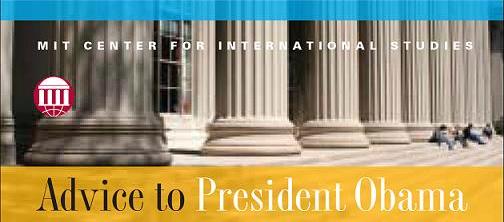
Innumerable policy shops and interest group around DC have already put out strategic blueprints for a policy agenda in the new administration. But if President Obama’s staff is committed to new and innovative ideas outside the traditional beltway parameters, as expressed during his campaign, he ought to take a look up at some proposals coming from up North.
MIT’s Center for International Studies, where I’ve recently began to hang my hat, has put out a very succinct briefing book on some familiar and some fresh foreign policy ideas. Some of the more provocative and notable ones include:
- Richard Samuels‘s proposal on Asia to forgo a democracy alliance that contains China for a more inclusive Asian security arrangement modelled on the OSCE, ASEAN, and six-party talks, with the interim being filled by a revitalized US-Japanese relationship;
- Barry Posen‘s suggestion to name the first European Supreme Allied Commander of NATO to limit free-riding and thrust greater responsibility and pride on European militaries and their publics;
- Fotini Christia‘s three-staged strategy to salvage Afghanistan beginning with negotiations with the Taliban to split their fractious ranks;
- Peter Krause‘s serious steps to win “the war of ideas” including tripling the number of annual fulbright students and reconfiguring Al-Hurra to a C-Span-like model;
- Sarah Zuckerman‘s approach to consolidate Plan Comumbia’s real though less visible gains by maintaining but redirecting funding away from aerial spraying and military units that continue to abuse human rights;
- Paul Staniland‘s advice to stifle the grand shuttle diplomacy impulse (much to Richard Holbrooke’s chagrin) for more subtle local policy initiatives in Kashmir to reach a settlement.
The entire set of proposals is worth reading. Do not let the brevity deceive you — each of these authors have eschewed the lengthy academic paper format to meet the needs of their target audience. It goes to show that people outside Washington are seriously trying to contribute to the conversation about America’s national security challenges. It remains to be seen whether those inside the beltway will listen.
–Sameer Lalwani


55 comments on “MIT’s Foreign Policy Advice to Obama”